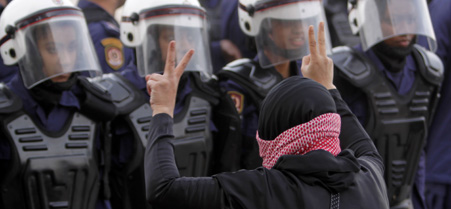Physical, virtual protests mesh best in Bahrain
 Protests in Bahrain have been ongoing for weeks.
Protests in Bahrain have been ongoing for weeks.
Arab spring watchers looking for a Twitter revolution with fewer of the traditional caveats about, among other things, the limited reach of the Internet in many Middle Eastern countries, should take a look at Bahrain, a Voice of America editor said Wednesday.
The tiny island kingdom of about 1 million people has 53 percent Internet penetration , according to the OpenNet Initiative, nearly twice the penetration of 24 percent in much larger Egypt, where the power of social media to aid street protests has received the most press.
More important, the nation's Internet users are hyper savvy and deeply connected with each other through social media, said Davin Hutchins, managing editor of Voice of America's Middle East Voices project.
"Even ordinary [online] Bahrainis, a doctor say, have 10,000 Twitter followers," he said. "They're very networked."
VOA aimed at covering and engaging with protesters and other online citizens in the Middle East and launched the Middle East Voices website in November.
Hutchins agreed with other speakers at a breakfast panel sponsored by the Washington chapter of the Internet Society on Wednesday that YouTube videos of police violence and Twitter-organized protests were "a catalyst, but not the cause" of 2011's uprisings in Tunisia, Egypt and other nations.
Bahrain comes closest, though, to being a model where online debate and protest don't simply catalyze their physical counterparts but also effectively stand in for them, he said.
Physical protests by Bahrain's Shiite majority were largely dormant for several months after a March 2011government crackdown aided by Saudi Arabia.They have recently resumed and are connected with the original protests' Feb. 14 anniversary.
Online protests, however, never ceased.
When Middle East Voices first launched its Facebook page was so flooded by Bahrainis' comments that within 48 hours that it couldn't effectively administer the page, Hutchins said.
"They were talking, yelling at us, yelling at each other with just this incredible social media literacy," Hutchins said. "We created a hash tag, #BahrainDebate and sent them to Twitter so we could administer the page again. And that hash tag was in use for months after that."
The hash tag's decline may have had less to do with a loss of interest than with an urge to avoid equally social media-savvy government-sponsored trolls who have allegedly harassed people they found discussing the nation online.
Earlier in February, Middle East Voices blogged about an open letter to the U.S. Congress denouncing anti-government protestors from the pro-government publication BahrainViews.com. The post included a poll about the letter.
Within three days, the poll had 15,000 votes and 80,000 visitors had viewed the post, Hutchins said. According to Google Analytics, about two-thirds of those blog visitors came from mobile phones, he said.
"They were Tweeting like mad," he said. "[Saying] 'go, go, get your vote in. We're going to win this one. No, the other side is winning.' They went back-and-forth and back-and-forth and the comments were very robust about the future of the country.
"I would say Bahrain represents really what the Western media thinks is happening all over the Arab world," he added, "which is this incredibly connected society that is politically engaged."






